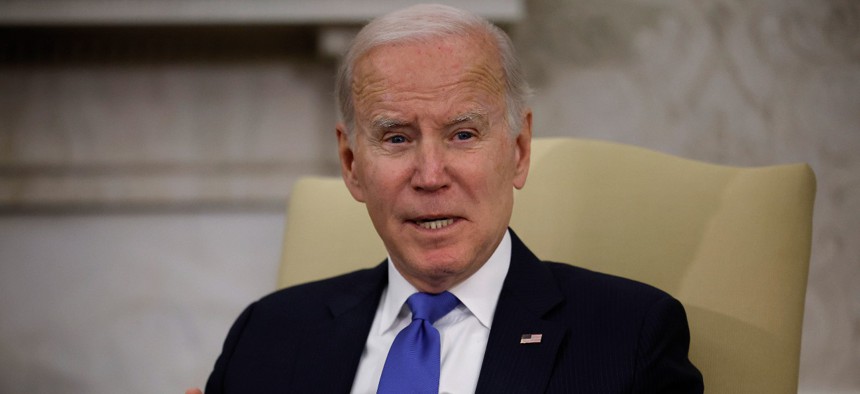
The Biden White House will end the public health and national emergencies on May 11. Chip Somodevilla/Getty Images
Coronavirus Roundup: The Emergencies Declared Due to COVID-19 Will be Ending
There’s a lot to keep track of. Here’s a list of this week’s news updates and stories you may have missed.
The White House said on Monday the administration plans to extend the COVID-19 national emergency and public health emergency for a little while, but end both on May 11. The emergencies–both declared under the Trump administration–were set to expire on March 1 and April 11, respectively.
“This wind-down would align with the administration’s previous commitments to give at least 60 days’ notice prior to termination of the [public health emergency],” said a statement of administration policy, in response to proposed measures from Republicans to end them sooner. “Ending these emergency declarations in the manner contemplated by H.R. 382 and H.J. Res. 7 would have two highly significant impacts on our nation’s health system and government operations.” Here are some of the other recent headlines you might have missed.
Rep. Raul Ruiz, D-Calif., an emergency medical physician, will serve as the ranking member on the House Select Subcommittee on the Coronavirus Pandemic. “As a physician and public health expert, I will take an equity-based and patient-centered approach to put people above politics and identify common-sense solutions that will protect our nation’s health,” he said in a statement on Wednesday. The other Democrats are listed here.
As the Health and Human Services Department develops a new program to quickly produce medical countermeasures during a pandemic, it should address the challenges raised by the current model that it’s had since 2012, the Government Accountability Office said in a new report. “According to [HHS’s Biomedical Advanced Research and Development Authority] and [the Defense Department], inconsistent funding and production work prior to the COVID-19 pandemic prevented sites from fully developing production capabilities,” said the report. Then, “although the COVID-19 pandemic response led to increased use of the sites, difficulties resulted from prior underuse.”
Going forward, “if HHS does not develop an effective program model, it may not secure the private sector partnerships necessary to provide countermeasure surge manufacturing capacity and capability during future public health emergencies,” the report continued. “Without a program that has the capability to build up, maintain, and regularly use domestic countermeasure manufacturing capabilities, HHS risks being unable to meet countermeasure manufacturing goals for future public health emergencies, especially if these emergencies bring about risks that the agency has not planned for, such as those experienced during the COVID-19 response.”
GAO outlined in a report released on Wednesday the challenges researchers have faced in investigating the origins of the pandemic as well as five policy options to address them. The release of the report coincided with a House Energy and Commerce Committee hearing. Republicans have repeatedly vowed to investigate the origins of COVID-19, which has been a contentious topic.
On Wednesday Rep. Jason Smith, R-Mo., chair of the House Ways and Means Committee, formally invited Michael Gald, acting director for COVID-19 fraud at the Justice Department, to testify before his committee for a hearing on unemployment fraud on February 8. “A growing body of evidence shows fraud from COVID-19 federal spending and government benefits has exceeded hundreds of billions of dollars, although the exact figure is not known,” he wrote. “This long overdue hearing will mark the beginning of the Committee’s investigation into the size, scope, and severity of fraud in federal pandemic unemployment programs.”
The Special Inspector General for Pandemic Recovery said in its latest quarterly report, released on Tuesday that five of its special agents are currently working on the Pandemic Response Accountability Committee’s fraud task force on a part-time basis. “These special agents are mostly assigned Payroll Protection Program cases while continuing to work their SIGPR investigative caseload,” the report said. “This initiative allows SIGPR to make a broader contribution to the IG community by assisting with a range of critical investigations that might otherwise remain unstaffed.”
Help us understand the situation better. Are you a federal employee, contractor or military member with information, concerns, etc. about how your agency is handling the coronavirus? Email us at newstips@govexec.com.







